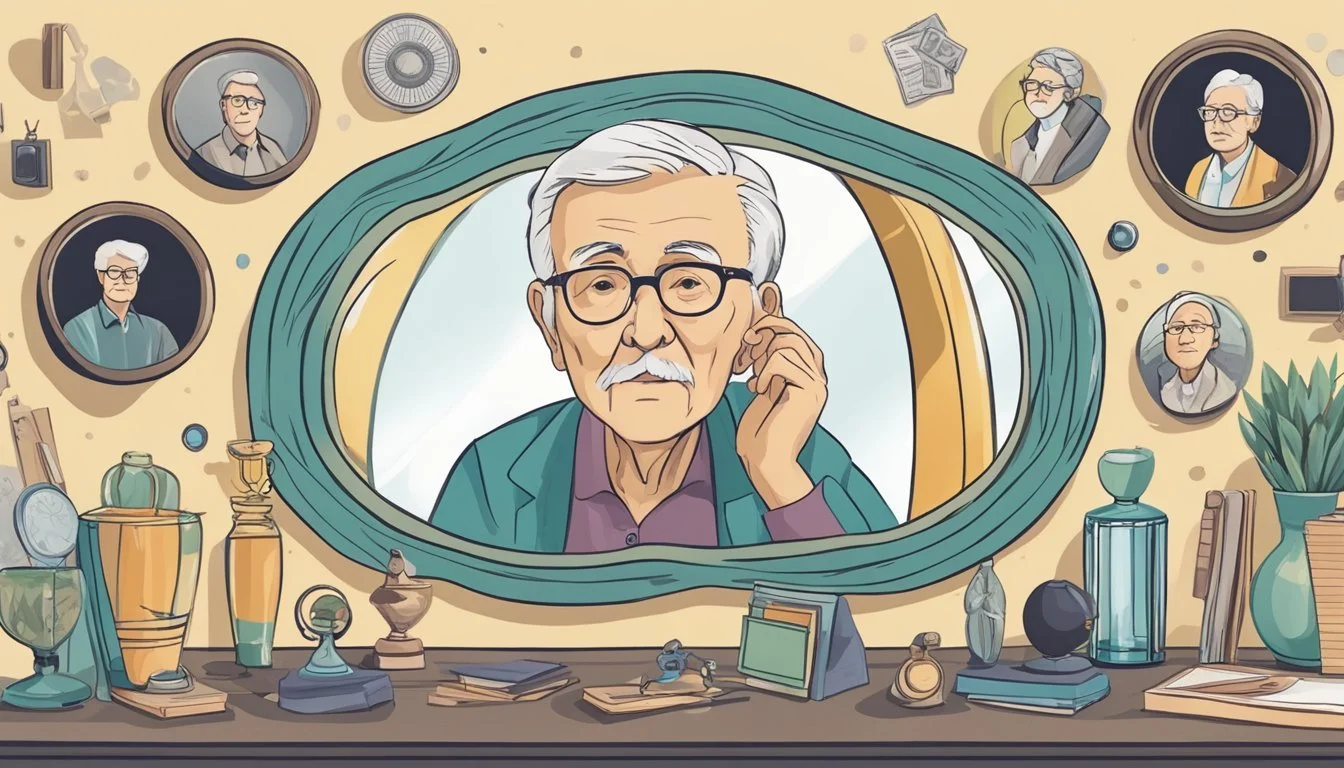Understanding Self-Centered Behaviors in Older Adults
Narcissism doesn't simply vanish with age. As narcissists enter their 60s and 70s, they often face unique challenges that can exacerbate their personality traits. The aging process tends to intensify a narcissist's fear of losing control, leading to increased defensiveness and attempts to maintain their self-perceived superiority.
These individuals may struggle to cope with the physical and social changes that come with getting older. Loss of youthful appearance, retirement, and decreased social influence can trigger heightened insecurity and desperate attempts to cling to their idealized self-image. Some aging narcissists become more aggressive or disagreeable in their communication, while others retreat into isolation to avoid confronting their diminishing abilities.
The impact of an aging narcissist can be particularly difficult for family members and caregivers. Their demands for attention and special treatment may increase, straining relationships further. Understanding these patterns can help those dealing with older narcissists navigate interactions more effectively and set appropriate boundaries.
Understanding Narcissism and Aging
Narcissism doesn't simply fade away with age. It evolves and manifests differently as individuals grow older, impacting their relationships and self-perception.
Narcissism in the Context of Aging
Narcissistic traits can persist into later life, though they may change in expression. Some individuals with narcissistic personality disorder may struggle to adapt to the physical and social changes that come with aging.
As narcissists age, they often face challenges in maintaining their grandiose self-image. The loss of youthful appearance and diminished social status can be particularly difficult for them to accept.
Research suggests that certain aspects of narcissism, such as the need for admiration, may decrease with age. However, other traits like entitlement and lack of empathy can remain stable or even intensify.
Changes in Behavior of Aging Narcissists
Aging narcissists may display increased irritability and aggression as they struggle to maintain control. They might become more defensive and prone to lashing out when their self-esteem is threatened.
Some older narcissists experience heightened paranoia and isolation. They may withdraw from social interactions to avoid exposing their perceived vulnerabilities or failures.
Others might intensify their attention-seeking behaviors, desperately clinging to any source of admiration or validation. This can lead to inappropriate or exaggerated actions in social settings.
Self-esteem and Sense of Superiority in Older Age
Maintaining a sense of superiority becomes increasingly challenging for aging narcissists. The inevitable decline in physical abilities and social influence can severely impact their self-esteem.
Some narcissists may compensate by exaggerating past achievements or fabricating new accomplishments. They might also seek to dominate and control family members or caregivers to preserve their sense of importance.
In extreme cases, the inability to reconcile their grandiose self-image with reality can lead to depression or increased narcissistic rage. This disconnect often strains relationships with family and friends.
Interpersonal Relationships
Narcissists in their 60s and 70s often struggle to maintain meaningful connections. Their interpersonal dynamics are characterized by complex family relationships, dwindling social circles, and challenging romantic partnerships.
Family Dynamics and Narcissistic Parents
Aging narcissistic parents frequently experience strained relationships with their adult children. Their inability to provide emotional support and tendency to prioritize their own needs can lead to resentment and distance.
Children of narcissists may limit contact or establish firm boundaries to protect themselves from manipulation. This can result in reduced involvement with grandchildren and family events.
Some narcissistic parents attempt to maintain control through financial leverage or emotional guilt-tripping. However, these tactics often backfire, further alienating family members.
The Nexus Between Narcissism and Social Circles
As narcissists age, their social networks typically shrink. Former colleagues and acquaintances may drift away, leaving them with fewer sources of admiration and attention.
Maintaining friendships becomes increasingly challenging due to their self-centered behavior and lack of empathy. Social gatherings may become less frequent or enjoyable for both the narcissist and their acquaintances.
Some narcissists attempt to compensate by seeking new social connections, often targeting younger individuals or joining community groups. However, these relationships tend to be superficial and short-lived.
Romantic Relationships: Patterns and Pitfalls
Romantic partnerships involving older narcissists are often marked by instability and conflict. Their need for admiration and difficulty with emotional intimacy can strain even long-term marriages.
Many narcissists in this age group have experienced multiple divorces or separations. They may struggle to find new partners willing to tolerate their behavior, leading to periods of loneliness.
Some narcissists become more dependent on their partners for care and attention as they age. This can create a challenging dynamic, especially if the partner has endured years of emotional neglect.
Narcissistic personality disorder can significantly impact an individual's ability to form and maintain healthy romantic relationships in later life. Professional help may be beneficial for both the narcissist and their partner.
Challenges Faced by Caregivers
Caring for a narcissistic individual in their 60s or 70s presents unique difficulties. Caregivers must navigate complex emotional dynamics while maintaining their own well-being.
Caring for Someone with Narcissism
Narcissistic seniors often display demanding behaviors and lack empathy. They may frequently criticize caregivers or make unreasonable requests. This can lead to emotional exhaustion and burnout for those providing care.
Narcissists typically struggle with accepting help, viewing it as a sign of weakness. This resistance can make daily tasks like medication management or personal hygiene challenging.
Mood swings are common, with seniors oscillating between neediness and rejection. Caregivers must remain patient and composed in the face of these unpredictable behaviors.
Setting Clear Boundaries
Establishing and enforcing boundaries is crucial when caring for narcissistic seniors. Caregivers should clearly communicate their limits regarding time, energy, and resources.
Examples of healthy boundaries:
Specific visiting hours
Designated "off-duty" times
Limits on financial assistance
Narcissists often push against boundaries, so consistency is key. Caregivers must stand firm in their decisions, even when faced with guilt-tripping or manipulation tactics.
It's important to remember that setting boundaries is not selfish, but necessary for sustainable care.
Finding Support and Coping Mechanisms
Caring for a narcissistic senior can be isolating. Support groups offer valuable connections with others facing similar challenges. These groups provide a safe space to share experiences and coping strategies.
Professional counseling can help caregivers process their emotions and develop resilience. Therapists experienced in narcissistic personality dynamics can offer tailored advice.
Self-care is essential. Caregivers should prioritize:
Regular exercise
Adequate sleep
Hobbies and personal interests
Respite care services allow caregivers to take much-needed breaks. Even short periods away can help recharge and prevent burnout.
Building a network of friends and family who understand the situation provides emotional support and practical assistance when needed.
Health Implications
Aging narcissists face unique health challenges as they enter their 60s and 70s. Their personality traits can significantly impact both mental and physical well-being, often exacerbating age-related issues.
Mental Health and Aging Narcissists
Narcissists may struggle with increased anxiety and depression as they age. The loss of admiration and attention can trigger intense emotional distress.
Cognitive decline may be particularly difficult for narcissists to accept. They often resist acknowledging memory lapses or reduced mental sharpness.
Some aging narcissists become more paranoid or suspicious of others. This can lead to social isolation and further deterioration of mental health.
Therapy can be beneficial, but narcissists may resist seeking help. Cognitive-behavioral approaches may help address maladaptive thought patterns.
Physical Health Factors
Narcissists' tendency to neglect self-care can worsen age-related health problems. They may avoid regular check-ups or downplay symptoms.
Chronic stress from maintaining their self-image can contribute to cardiovascular issues and weakened immune function.
Some narcissists push themselves too hard physically to maintain a youthful appearance. This can lead to injuries or exhaustion.
Substance abuse may increase as narcissists attempt to cope with aging. This further compromises their physical health.
Intersection of Dementia and Narcissistic Traits
Dementia can exacerbate narcissistic behaviors in some individuals. Confusion and memory loss may heighten paranoia and aggression.
Narcissists with dementia often struggle more with losing independence. They may lash out at caregivers or refuse necessary assistance.
The onset of dementia can be especially challenging for family members of narcissists. Balancing care needs with difficult behaviors requires patience and support.
Early intervention and consistent care routines are crucial. Structured environments can help manage both dementia symptoms and narcissistic tendencies.
Psychological Trajectories
As narcissists age into their 60s and 70s, their psychological patterns often shift. These changes can manifest in various ways, impacting their relationships, self-perception, and overall mental health.
Longitudinal Studies on Narcissistic Development
Research tracking narcissistic traits over time reveals intriguing patterns. A study by Weidmann et al. (2023) examined age differences across eight narcissism measures. Results showed that certain narcissistic traits tend to decrease with age, while others may persist or even intensify.
Grandiosity often declines as narcissists face age-related challenges. Physical changes and reduced social status can undermine their inflated self-image. However, entitlement and lack of empathy may remain stable or worsen.
Some narcissists develop increased wisdom and self-reflection with age. This can lead to improved interpersonal relationships and greater emotional stability. Others, however, may become more rigid in their narcissistic behaviors.
Patterns of Regress or Progression in Narcissists
As narcissists enter their 60s and 70s, some experience a phenomenon known as "narcissistic collapse." This involves a sharp decline in self-esteem and increased vulnerability when faced with age-related losses.
Key factors influencing regression or progression:
Health status
Financial security
Social support networks
Career achievements
Narcissists who maintain their physical appearance and social status may show less psychological decline. Those facing significant losses often struggle more with adjustment and may become increasingly bitter or withdrawn.
Some aging narcissists develop greater compassion and empathy. This positive progression can lead to improved relationships and increased life satisfaction.
Therapeutic Interventions and Management
Professional support plays a crucial role in managing narcissistic traits in older adults. Therapy focused on developing empathy and realistic self-perception can be beneficial.
Effective therapeutic approaches:
Cognitive-behavioral therapy
Schema therapy
Mindfulness-based interventions
Family members and caregivers may benefit from counseling to understand and cope with the narcissist's behavior. Setting clear boundaries and maintaining emotional distance can protect against manipulation.
Support groups for family members of narcissists provide valuable resources and coping strategies. These groups offer a safe space to share experiences and learn from others facing similar challenges.
Cultural and Societal Reflections
Narcissism in older adults intersects with broader cultural attitudes and societal influences. The media, public perceptions, and age-related expectations all play a role in shaping how narcissistic traits manifest and are perceived in individuals aged 60-70.
Public Perceptions and the Narcissistic Individual
Public views of aging narcissists often reflect a mix of stereotypes and evolving social norms. Many perceive older narcissists as particularly bitter or resistant to change. This perception can stem from the clash between narcissistic traits and the physical and social changes that come with aging.
Exploitation remains a concern, with some viewing aging narcissists as potentially vulnerable to manipulation by others seeking to take advantage of their need for admiration. Conversely, others may see them as manipulative themselves, using their age as a tool for garnering sympathy or special treatment.
Bigotry can become more pronounced in aging narcissists, as rigid thought patterns and a desire to maintain status may lead to increased prejudice against outgroups.
Media Influence on Narcissism and Aging
Media portrayals significantly shape societal views of aging narcissists. Films and television often depict older narcissistic characters as either comically out of touch or dangerously manipulative. These representations can reinforce stereotypes and influence real-world interactions.
Social media platforms present unique challenges and opportunities for aging narcissists. They may struggle to adapt to changing online norms or feel pressure to maintain a youthful image. Some embrace these platforms as new avenues for seeking attention and validation.
News media coverage of high-profile older narcissists in politics or business can sway public opinion on the impact of narcissistic traits in leadership roles among the 60-70 age group.
Age-Related Attitudes Towards Narcissistic Behavior
Society often holds different expectations for behavior as individuals age. Narcissistic traits that might be tolerated or even admired in younger adults may be viewed more critically in those aged 60-70. This shift can lead to increased social isolation for aging narcissists who fail to adjust their behavior.
Cultural values around respect for elders can complicate responses to narcissistic behavior in older adults. Some may hesitate to challenge or confront narcissistic actions out of deference to age, potentially enabling harmful patterns.
Generational differences in attitudes towards mental health and personality disorders also influence how narcissistic behavior is perceived and addressed in older populations. Younger generations may be more likely to recognize and label narcissistic traits, while older peers might normalize or excuse such behavior.
Strategies for Self and Relationship Management
Effective self-care practices and relationship management skills are essential for navigating life with a narcissistic partner in their 60s or 70s. These strategies help maintain emotional well-being and personal identity while fostering healthier interactions.
Developing Self-Care Rituals
Prioritize daily self-care activities to protect mental and emotional health. Engage in regular exercise, such as gentle yoga or walking, to boost mood and reduce stress. Practice mindfulness meditation to stay grounded and centered.
Pursue hobbies and interests independent of the relationship. This helps maintain a sense of self and provides outlets for personal expression and joy. Consider joining clubs or groups related to these interests to expand social connections.
Establish a consistent sleep routine to promote physical and mental rejuvenation. Aim for 7-9 hours of quality sleep each night. Create a relaxing bedtime ritual, such as reading or listening to calming music.
Navigating Relationships With Grace and Wisdom
Set clear, firm boundaries to protect personal space and emotional well-being. Communicate these boundaries calmly and consistently. Use "I" statements to express feelings and needs without accusation.
Develop a support network of trusted friends, family members, or support groups. These connections provide emotional validation and alternative perspectives. Regularly schedule time with supportive individuals to combat feelings of isolation.
Practice emotional detachment techniques to reduce reactivity to narcissistic behaviors. This might include deep breathing exercises or mentally stepping back from conflicts. Respond to provocations with calm, factual statements rather than emotional reactions.
Maintaining a Sense of Self Amidst Aging
Focus on personal growth and lifelong learning to maintain cognitive function and self-esteem. Take classes, attend lectures, or learn new skills to stay engaged and intellectually stimulated.
Cultivate a positive self-image through affirmations and self-compassion exercises. Regularly acknowledge personal strengths and accomplishments. Write down three things to be grateful for each day to foster a positive mindset.
Stay physically active to maintain health and independence. Engage in age-appropriate exercise routines, such as swimming or tai chi. Regular physical activity boosts mood, energy levels, and overall well-being.
Coping with the Inevitable: Understanding Narcissistic Injury and Aging
Narcissistic injury becomes more pronounced as individuals with narcissistic personality disorder enter their 60s and 70s. This heightened sensitivity stems from the inevitable changes that accompany aging.
The loss of physical attractiveness, declining health, and diminished social status can trigger intense feelings of vulnerability and shame in aging narcissists. These changes challenge their long-held self-image of superiority and perfection.
Denial often serves as a primary defense mechanism. Aging narcissists may refuse to acknowledge physical limitations or seek medical care, exacerbating health issues. They might also engage in age-inappropriate behaviors to maintain a youthful facade.
Anger frequently surfaces as narcissists struggle to cope with their changing circumstances. This anger may be directed at family members, caregivers, or medical professionals who remind them of their mortality and limitations.
The loss of control over their environment and relationships can be particularly distressing. As their social circle naturally shrinks, aging narcissists may become increasingly isolated and paranoid.
Coping strategies for those interacting with aging narcissists include:
Setting firm boundaries
Practicing emotional detachment
Seeking support from therapists or support groups
Focusing on self-care and personal well-being
Understanding the complex interplay between narcissistic injury and aging can help family members and caregivers navigate these challenging relationships more effectively.
Conclusion: Anticipating the Golden Years with Self-awareness and Support
Narcissists entering their 60s and 70s face unique challenges as they age. Self-awareness becomes crucial for those seeking personal growth and improved relationships.
Recognizing the need for genuine connections can lead to more fulfilling interactions. Narcissists may find value in cultivating compassion and empathy towards others.
Support groups offer valuable resources for individuals working to manage narcissistic tendencies. These groups provide a safe space to share experiences and learn from peers.
Relationships take on new importance in later years. Narcissists who make efforts to build authentic connections may find greater satisfaction and companionship.
Wisdom gained through life experiences can be a catalyst for positive change. Embracing vulnerability and letting go of the need for constant admiration can lead to personal growth.
Professional help remains a valuable option for those struggling with narcissistic traits. Therapists can provide guidance and tools for managing behaviors and improving interpersonal skills.
Ultimately, the golden years present an opportunity for self-reflection and transformation. With dedication and support, narcissists can work towards healthier relationships and increased well-being.










